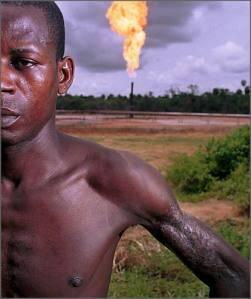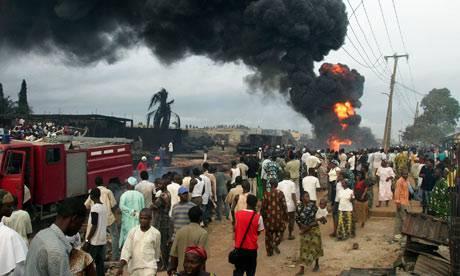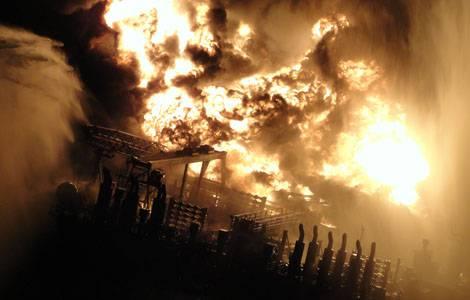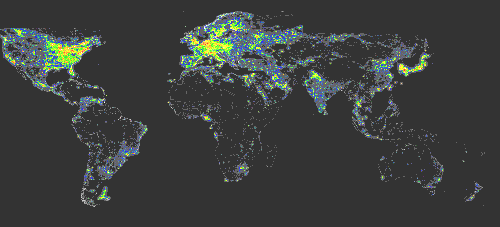 All the eyes of the world are turned to the beaches of the most dominant nation of our times. The world is watching closely as this pivotal culture wrestles with this unprecedented environmental catastrophe. Will Obama use this as his movement to make a clean break and fundamentally restructure the energy infrastructure in the same way that 9/11 was used as the catalyst to restructure US foreign policy? Will regulation be changed in such a way that big business can no longer dictate the terms of its own scrutiny? Will BP finally be seen for the serial offender and gross violator of nature that it really is… yada yada.

A Nigerian man stands in front of the flare that burned him (Source: http://www.chrishondros.com)
But wait a second… is this really an unprecedented environmental catastrophe? Or is it really that a far bigger fuss is made when the USA and its sacrosanct way of life is threatened? Just across the Atlantic a far larger spill has been ravaging the coastal ecosystem, poisoning the people and devastating a way of living for over two decades. Nobody is watching and nobody cares. Presumably this is because this is not an aspirational culture. It is not a holiday destination and could it also be because the oil is harder to see on the people’s skin? This is Africa and the people being poisoned are Nigerian.
SUPPORTED BY HEROES LIKE YOU
Support independent eco journalism that drives real change.
A ruptured pipeline burns in a Lagos suburb after an explosion in 2008 which killed at least 100 people. Photograph: George Esiri/Reuters
The companies operating (Shell, Agip, ExxonMobil) may be different but the catastrophe is exactly the same. This is the inanity of Obama rounding on BP and calling it ‘British Petroleum’. It doesn’t matter which company it is or which country it is head office is based in. This is the same dirty shit. This is massive corporations that have grown too big to control doing what they were set up to do. Converting natural capital into cash as fast as humanly possible to satisfy the false god made manifest by the demons at Harvard Business School that have for years spread their sick sermon of shareholder return over people and the planet. These tormented cogs in an ungodly machine have sold their souls along with the planet and now we reap the vengeance as hell is brought down to our earthly paradise.

Kids play football in front of a flare (Source: http://www.chrishondros.com)
The Nigerian coastline has had to endure 1.5m tons of oil. More oil is spilled from the delta’s network of terminals, pipes, pumping stations and oil platforms every year than has been lost in the Gulf of Mexico, What isn’t spilt is shipped to… you’ve guessed it! Our favourite Empire… the Niger delta supplies 40% of all the crude the United States imports. The burden of its role as furnace stokers of the bloated, inefficient and distended US machine is almost too much to bear. Life expectancy in its rural communities, half of which have no access to clean water, has fallen to little more than 40 years over the past two generations.

A devastated land
In this unregulated, pioneer land western companies bribe the government and suffocate dissent allowing them to cut endless corners and operate as cheaply as possible. By their sick algebra the most profitable means of extracting the black gold is simply to burn the accompanying gas (a scarce and valuable resource) off in flares (definition below). In Nigeria there are flares that have been burning continuously since 1972. You don’t need a degree in atmospheric or environmental science to know that deep down this is just wrong. All this goes to show without a shadow of a doubt that we do not face a choice. The questions have already answered and it is a no-brainer. Two roads bifurcate in front of us. One leads to a sustainable future in which we shift rapidly away from fossil fuels; live more locally; work fewer hours; shift our attentions from consumption to creativity; from competition to cooperation and provide space for the natural world to recover and evolve. This way of life is not mysterious. It is not fanciful. It is not utopian. It is practical and people are already doing it. Transition Towns show how to implement an ‘energy decent plan’ and check this new report from the Centre from Alternative Technology and NEF outlines a zero-carbon vision of the UK within20 years. The other road leads straight to hell. People of earth… the choice is yours.

Deepwater Horizon in flames off the coast of Louisiana (Photo Credit: Courtesy of Steadfast TV)
Gas flare definition (source: wikipedia) A **gas flare**, alternatively known as a flare stack, is an elevated vertical conveyance found accompanying the presence of oil and gas wells, rigs, refineries, chemical plants, natural gas plants, and landfills. They are used to eliminate waste gas which is otherwise not feasible to use or transport. They also act as safety systems for non-waste gas and is released via pressure relief valve when needed to ease the strain on equipment. They protect gas processing equipments from being overpressured. Also in case of an emergency situation, the flare system helps burn out the total reserve gas.[[1]](http://en.wikipedia.org/wiki/Gasflare#citenote-0)[[2]](http://en.wikipedia.org/wiki/Gasflare#citenote-1)[[3]](http://en.wikipedia.org/wiki/Gasflare#citenote-2)

Extensive flaring makes Nigeria glow bright in the dark of Africa
Flaring and venting of natural gas from oil & gas wells is a significant source of greenhouse gas emissions. Its contribution to greenhouse gases has declined by three-quarters in absolute terms since a peak in the 1970s of approximately 110 million metric tons/year and now accounts for 0.5% of all anthropogeniccarbon dioxide emissions.[[4]](http://en.wikipedia.org/wiki/Gasflare#citenote-3) The World Bank estimates that over 150 billion cubic metres of natural gas are flared or vented annually, an amount worth approximately 30.6 billion dollars, equivalent to 25 percent of the United States’ gas consumption or 30 percent of the European Union’s gas consumption per year.[[5]](http://en.wikipedia.org/wiki/Gasflare#citenote-4) This flaring is highly concentrated: 10 countries account for 75% of emissions, and twenty for 90%. The largest flaring operations occur in the Niger Delta region of Nigeria. The leading contributors to gas flaring are (in declining order): Nigeria, Russia, Iran, Algeria, Mexico, Venezuela, Indonesia, and the United States.[[6]](http://en.wikipedia.org/wiki/Gasflare#citenote-5) In spite of a ruling by the Federal High Court of Nigeria (that forbade flaring) in 2005, 43% of the gas retrieval was still being flared in 2006. It will be prohibited by law as of 2008. _[citation needed][Russia](http://en.wikipedia.org/wiki/Russia "Russia") has announced it will stop the practice of **gas flaring** as stated by deputy prime minister Sergei Ivanov on Wednesday September 19, 2007.[[7]](http://en.wikipedia.org/wiki/Gasflare#citenote-6) This step was, at least in part, a response to a recent report by the [National Oceanic and Atmospheric Administration](http://en.wikipedia.org/wiki/NationalOceanicandAtmosphericAdministration "National Oceanic and Atmospheric Administration") (NOAA) that concluded Russia’s previous numbers may have been underestimated. The report, which used night time light pollution satellite imagery to estimate flaring, put the estimate for Russia at 50 billion cubic meters while the official numbers are 15 or 20 billion cubic meters. The number for Nigeria is 23 billion cubic meters.[[8]](http://en.wikipedia.org/wiki/Gasflare#cite_note-7)



